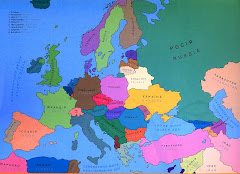
 With one hand clapping, it takes a while to get ready to leave the warmth of Luba's to brave the cold of winter. We had our first snowfall last night. A light dusting of white flakes covers house tops, trees and roads. It's pretty.
With one hand clapping, it takes a while to get ready to leave the warmth of Luba's to brave the cold of winter. We had our first snowfall last night. A light dusting of white flakes covers house tops, trees and roads. It's pretty. I am going back to NGO Victoria for the first time since breaking my arm. I walk carefully from Panfelova to Lenin Park, snug in the winter clothes I had brought in anticipation of this time. They are clothes I bought In Toledo that I didnt need in Florida. A flu epidemic has been declared in several oblasts and most schools and public buildings are closed. It's quiet in Starobilsk. White and silent.
I'm not quite ready to do battle, but the warriors are at work. Among them are my friends Olga and Tonia. Victoria's is having a meeting about the gasoline station the city wants to build on the river Aydar that runs through Starobilsk.
Most people are opposed to having a petrol station on their precious river. "Any place but the river," they say.
Most people are opposed to having a petrol station on their precious river. "Any place but the river," they say.
As I understand it, there are environmental ordinances and laws against this type of building, which the city and some business interests are ignoring. There is also a law requiring public input for such projects.
NGO Victoria wants to ensure that such laws are enforced. It is in keeping with the "Know Your Rights" project, for which I am writing a grant to the Peace Corps. Victoria is providing public forums, meeting with city and oblast officials, making tons of phone calls, giving people a chance to speak up and speak out.
I may not understand Russian, but I understand community organizing. I understand the importance of giving voice to those who oppose the direction of their government when it is contrary to the people's interest. And I understand the environmental concerns that motivate such actions. Many of us in Florida don't want oil drilling in the Gulf of Mexico, off our beautiful and fragile shoreline.
It's about making democracy work. It's about holding government officials at all levels, from the local to the national, accountable for enforcing the laws and being responsive to the will of the people most affected by their actions. It is about transparancy and accountability.
Victoria's seems to be the center for this kind of action here, and in much of far eastern Lugansk oblast. This former Soviet town, still so connected to Russia in many ways, by language, culture, and family ties, is on the move. The warriors are arming themselves.
I am a silent observer, but the small office is crowded with 12 articulate activists, and others who come and go, showing their support. Some are members of a World War II veterans association. Some are friends of the river. Some, like Olga and Tonia, are fearless critics of what they see as the folly and intransigence of local government. It's an impressive effort.
I'm not sure what the status of this project is, but I don't think the activist are going to let the city build a gas station on their river, at least not without a fight.
Oleg, a journalist whom I met a few weeks ago at the office, is at his computer taking notes. I think it's part of his project for a Soros grant. That in itself is of interest to me and I hope to learn more about it in time.
Oleg, a journalist whom I met a few weeks ago at the office, is at his computer taking notes. I think it's part of his project for a Soros grant. That in itself is of interest to me and I hope to learn more about it in time.
I am still putting the pieces of the puzzle together.
But I am getting the picture. If the citizens gathered at Victoria's have a say in it, Starobilsk will continue its march toward a democracy that works for all the people, not just the few. The warriors are on the rise.




























No comments:
Post a Comment